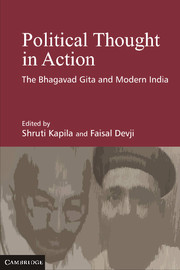Book contents
- Frontmatter
- Contents
- List of Contributors
- Acknowledgements
- Introduction
- 1 India, the Bhagavad Gita and the World
- 2 The Transnational Gita
- 3 The Transfiguration of Duty in Aurobindo's Essays on the Gita
- 4 Gandhi's Gita and Politics as Such
- 5 Gandhi on Democracy, Politics and the Ethics of Everyday Life
- 6 Morality in the Shadow of Politics
- 7 Ambedkar's Inheritances
- 8 Rethinking Knowledge with Action: V. D. Savarkar, the Bhagavad Gita and Histories of Warfare
- 9 A History of Violence
- Index
Introduction
Published online by Cambridge University Press: 05 January 2014
- Frontmatter
- Contents
- List of Contributors
- Acknowledgements
- Introduction
- 1 India, the Bhagavad Gita and the World
- 2 The Transnational Gita
- 3 The Transfiguration of Duty in Aurobindo's Essays on the Gita
- 4 Gandhi's Gita and Politics as Such
- 5 Gandhi on Democracy, Politics and the Ethics of Everyday Life
- 6 Morality in the Shadow of Politics
- 7 Ambedkar's Inheritances
- 8 Rethinking Knowledge with Action: V. D. Savarkar, the Bhagavad Gita and Histories of Warfare
- 9 A History of Violence
- Index
Summary
By turns a child and killer, trickster and philosopher, Krishna's appeal in modern India is not just diverse but fundamentally ambiguous. Unlike his high-minded fellow incarnation Rama, for example, as a political icon Krishna is so indeterminate as to resist capture by any party or platform, though not because he expresses the multiplicity of Hinduism in some way that liberals can celebrate. For rather than being politically polymorphous, Krishna speaks to us about the possibility of moral action in conditions marked by discontinuity and the breakdown of order. Yet the Dark Lord's behaviour and advice in these conditions, whose lawlessness defines the story of his life, should not be seen as describing only the limits or exceptions to a moral rule. Instead, we want to argue, transformation and rupture constitute the ground of any politics that can be thought in Krishna's name. And this volume of essays makes the claim that politics in modern India has been thought precisely and primarily in Krishna's name, with an extraordinary number of the country's leaders and intellectuals, starting in the nineteenth century, attending closely and even obsessively to his advocacy of war in the Bhagavad Gita. For we shall see that in addition to the violence that characterizes it, the war described by Krishna provided these men with a radically democratic way of thinking about politics outside the hierarchical language of order and stability that is associated with the figure of Rama.
- Type
- Chapter
- Information
- Political Thought in ActionThe Bhagavad Gita and Modern India, pp. ix - xvPublisher: Cambridge University PressPrint publication year: 2013
- 1
- Cited by



